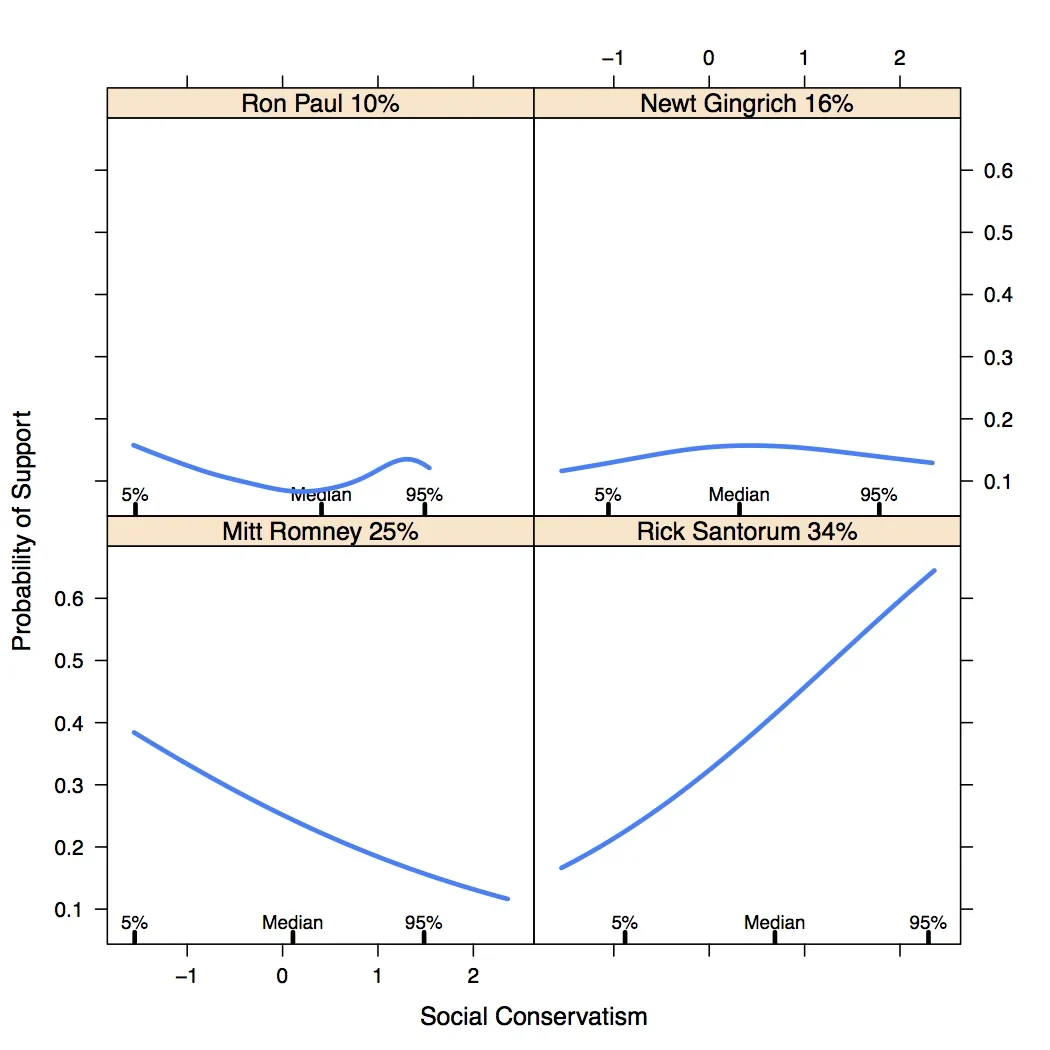The critical role of social conservatives in the Republican Party is a staple of contemporary American politics. The rise of Rick Santorum in the Republican primary contest is compelling evidence of the power of this group.
Recent polling conducted by YouGov offers several insights into the role social conservatives play in the Republican nominating contest (n=1,000, Feb 18-19, 2012). Among respondents indicating that that they were likely to vote in the Republican primary, Santorum led Mitt Romney 34% to 25%, consistent with other national polls from that same time period.
Respondents to the poll were asked if they found particular activities ‘‘morally acceptable’’ or ‘‘morally wrong.’’ Nine activities were listed: birth control, divorce, gambling, the death penalty, premarital sex, doctor-assisted suicide, abortion, and gay or lesbian relations. As the table shows, in every instance, respondents likely to vote in the Republican primaries and caucuses were more likely to report a more socially conservative position than the sample as a whole. Among respondents likely to vote in the Republican primaries, Santorum supporters report far more socially conservative beliefs than do Romney supporters. Less than 1/3 of Romney supporters say that premarital sex is morally wrong (the same rate as in the general population), while over a 1/2 of Santorum supporters say that it is. Seventy percent of Santorum supporters say that gay or lesbian relations are morally wrong, while just 48% of Romney supporters report this belief, much closer to the general population estimate of 40%. On social issue after social issue we find the same pattern: Romney supporters are much closer to the general population than are Santorum supporters. The abortion issue is something of an exception, with Romney supporters (53%) falling close to the halfway point between Santorum supporters (72%) and the general population (38%).
Table 1: Percent Reporting Activity to be Morally Wrong
| All | Likely Republican Primary Voters | Romney Supporters | Santorum Supporters | |
|---|---|---|---|---|
Birth Control | 7 | 9 | 1 | 18 |
Divorce | 14 | 24 | 15 | 29 |
Gambling | 19 | 21 | 21 | 26 |
Death Penalty | 20 | 11 | 9 | 11 |
Premarital Sex | 30 | 42 | 30 | 52 |
Doctor-Assisted Suicide | 32 | 42 | 29 | 56 |
Abortion | 38 | 62 | 53 | 72 |
I combined the responses to the nine responses into a scale, with an average of zero, such that positive numbers indicate more ‘‘social conservatism’’ and negative numbers indicating less. I then examined the way that this scale predicts support for the various Republican candidates. The results appear in the figure, below. Among the most socially conservative respondents likely to vote in the Republican primary, Santorum captures over 60% of the vote. On the other hand, Romney’s support falls to just over 10% in this group, with Romney’s strongest level of support among the most socially liberal respondents likely to vote in the Republican primary. Among this group of respondents, Romney’s support is close to 40%. Interesting, Ron Paul draws support from both ends of the social conservatism dimension, with socially liberal Republicans and a small proportion of social conservatives supporting Paul. The sixteen percent of likely Republican voters supporting Gingrich tend to be relatively moderate on the social conservatism dimension.

These results highlight the great challenge facing the Republican party right now. Social issues energize and mobilize voters that might otherwise be disengaged from politics. Social conservatives are flocking to Santorum, propelling him to a commanding position in many national polls tracking Republican primary support.
But socially conservative positions are, well, conservative, relative to the views of the population at large, and even other Republican primary voters. Santorum’s success now --- to the extent that it relies on giving political oxygen to a conservative agenda on social issues --- spells trouble for the Republicans in the general election. Before then, the results shown here would suggest that Republicans will struggle to unite behind either Romney or Santorum, or anyone else for that matter. Romney is clearly the more electable candidate, if his supporters’ positions on social issues are any guide. But can he prevail? And if Romney is the Republican nominee, will social conservatives turn out to support him in November?









